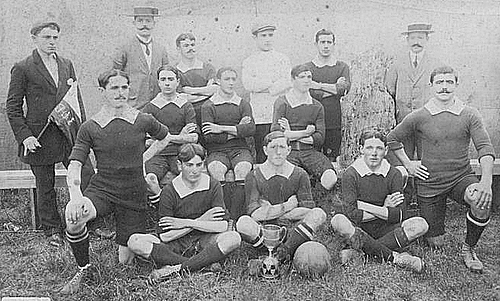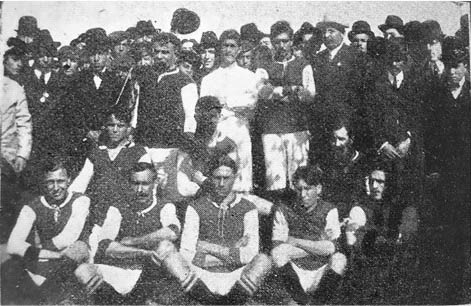|
1988–89 In Argentine Football
1988–89 in Argentine football saw Independiente win the Argentine championship. In the international competitions there were two editions of the Copa Libertadores, the best performance came from Newell's Old Boys who were runners up in the Copa Libertadores 1988. Racing Club were the inaugural champions of the Supercopa Sudamericana, their first championship of any description since 1967. League championship The Argentine league championship featured an unusual points system. After each drawn match there was a penalty shootout to determine which team got the bonus point. *3 points: won match *2 points: draw, win on penalties *1 point: draw, loss on penalties :0 points: lost match The tournament also featured an unofficial Apertura tournament to determine the two teams to qualify for the Copa Libertadores 1989. Racing Club and Boca Juniors were in the top two positions at the halfway stage of the season (after 19 games), and qualified. Final table *Independiente qualify ... [...More Info...] [...Related Items...] OR: [Wikipedia] [Google] [Baidu] |
Club Atlético Independiente
Club Atlético Independiente () is an Argentina, Argentine professional sports club, which has its headquarters and stadium in the city of Avellaneda in Greater Buenos Aires. The club is best known for its Association football, football team, which plays in the Argentine Primera División, Primera División and is considered one of The Big Five of Argentine football, Argentina's ''Big Five'' football clubs. Independiente was officially founded on 1 January 1905, although the institution had been formed on 4 August 1904. Originally from Monserrat, Buenos Aires, Monserrat, a neighbourhood of Buenos Aires, the club moved to Avellaneda in 1907. The association football, football team has won 16 Argentine Primera División, Primera División titles (the last one was the 2002–03 Argentine Primera División#Torneo Apertura, 2002 Apertura) and 9 List of Argentine football national cups, National cups. In CA Independiente in international football, international club football competiti ... [...More Info...] [...Related Items...] OR: [Wikipedia] [Google] [Baidu] |
Textil Mandiyú
Club Social y Deportivo Textil Mandiyú, commonly referred as Textil Mandiyú was an Argentine football club, based in Corrientes, in the Province of the same name. The squad currently plays in the regionalised third tier of Argentine football league system, the Torneo Federal A. History In 1993, Deportivo Mandiyú chairman Eduardo Seferian tried the club to become a S.A. as a way to solve the serious economic problems of the institution but the Argentine Football Association did not allow the transaction. Nevertheless, in 1994 member of Argentine Parliament Roberto Cruz and San Lorenzo leading Roberto Navarro acquired the club for U$S 2 million. Mandiyú hired Diego Maradona as coach, also bringing international goalkeeper Sergio Goycochea to the team. The project was a big failure, so Mandiyú did a disappointing campaign in 1995 Clausura being relegated to the second division. Finally, the group that managed Mandiyú left the team alleging that they had not enough resou ... [...More Info...] [...Related Items...] OR: [Wikipedia] [Google] [Baidu] |
Ariel Cozzoni
Ariel Osvaldo Cozzoni (born 21 January 1964) is a former Argentine football striker. He played club football in Argentina, France and Mexico. Cozzoni started his professional playing career in 1985 with Newell's Old Boys. He was loaned to Instituto de Córdoba for the 1988–1989 season, but returned in 1990 to help Newell's to win the 1990–1991 championship. During the season, he was the league's top goalscorer with 23 goals. After the 1991 season, he joined OGC Nice in France and then went on to play for in Mexico before returning to Newell's in 1993. In 1994, Cozzoni joined |
Juan Comas
Juan Comas Camps (January 23, 1900 in Alayor, Menorca, Spain – January 18, 1979 in Mexico City, Mexico) was a Spanish-Mexican anthropologist, notable for his critical work on race, and his participation in drafting the UNESCO statement on race. He fled Spain during the regime of Franco, and spent the rest of his life in Mexico. He was professor of physical anthropology at the National Institute of Anthropology and History in Mexico between 1940 and 1943, and at the National Autonomous University of Mexico from 1955 until his death. Early life Comas was born in the small town of Alayor, Spain, located in the center of the Menorca Island in the Mediterranean Sea, 150 miles southeast of Barcelona. During this time, Spain was facing social and political changes that would shape his later work. His father was a teacher in Menorca, and Juan Comas followed in his steps. At the age of seventeen he received degrees in Arts and Sciences and title of elementary teacher. Four years ... [...More Info...] [...Related Items...] OR: [Wikipedia] [Google] [Baidu] |
Néstor Raúl Gorosito
Nestor is a given name of Greek origin. In Greek mythology it comes from that of Nestor, the son of Neleus, the King of Pylos and Chloris. The Greek derivation is from a combination of "νέομαι" eomai- "go back", and "νόστος" ostos- "one who returns from travels". People with the name * Nestor of Gaza (died c. 362), early Christian martyr * Nestor of Laranda (2nd–3rd century), Greek poet * Nestor of Magydos or ''Saint Nestor'', Christian saint (died 250) * Nestor of Thessaloniki, another saint (died c. 300) * Nestorius (c.386–c.451), Patriarch of Constantinople, 428–431 * Nestor the Chronicler (c.1056–c.1114), reputed author of the earliest East Slavic chronicle * Néstor Botero (1919-1996), Colombian journalist, writer and merchant * Nestor Carbonell (born 1967), American actor * Nestor Forster (1963–), Brazilian diplomat * Néstor García (other), multiple people * Nestor Ignat (1918–2016), Romanian journalist and writer * Néstor Kirchner (1 ... [...More Info...] [...Related Items...] OR: [Wikipedia] [Google] [Baidu] |
Oscar Dertycia
Oscar Alberto Dertycia Álvarez (born 3 March 1965) is an Argentine retired footballer who played as a striker, who later worked as a manager. Club career Born in Córdoba, Córdoba Province, Dertycia started playing professionally with hometown club Instituto de Córdoba, moving in 1985 to Argentinos Juniors. During his four-year spell, he won the Copa Libertadores and finished runner-up in the Intercontinental Cup in his first season 1985, and was also crowned the Primera División's top scorer in 1988–89, finishing with 20 goals. In the following summer, the player known as ''Tiburón'' ('the shark') due to his powerful playing style joined Italy's ACF Fiorentina, playing alongside the likes of Roberto Baggio and Dunga. After finding some form following a difficult start, a serious knee injury sustained in a clash with compatriot Diego Maradona in January 1990 ended his season early, while in his absence the team reached the final of the 1989–90 UEFA Cup. Only thr ... [...More Info...] [...Related Items...] OR: [Wikipedia] [Google] [Baidu] |
Copa Libertadores 1990
The Copa Libertadores 1990 was won by Club Olimpia after defeating Barcelona Sporting Club with a 3-1 aggregate in the finals. One of the players for Olimpia was legendary goalkeeper Ever Hugo Almeida, who retired from professional football the following year. Group stage Group 1 Group 2 *Note: The other two Colombian teams that qualified for the tournament withdrew due to logistical issues, as CONEMBOL banned Colombia from hosting matches due to threats made by drug lords to referees in the previous tournament in 1989, with the murder of one of them interrupting the league without a champion being declared. The champion, Atletico Nacional of Medellín, had a bye to the second round as the current champion, but had to play their home games in Chile for this tournament. Group 3 Group 4 First Place Playoff Match CA Progreso beat Defensor Sporting Defensor Sporting Club is a sports club based in Montevideo, Uruguay. Founded in 1913, Defensor has several sports sect ... [...More Info...] [...Related Items...] OR: [Wikipedia] [Google] [Baidu] |
Club Deportivo Armenio
Club Deportivo Armenio is a football club from Ingeniero Maschwitz, Greater Buenos Aires, Argentina. The team currently plays in the Primera B Metropolitana, which is the regionalised third division of the Argentine football league system. History The club was founded in 1962 under the name ''Club Armenio de Fútbol'' by the Armenian community in Argentina. It changed its name in 1968, and was affiliated to the Argentine Football Association two years later. The original colours were black and white, but first changed to green and white stripes and then again to red and white. Nowadays, home uniform is red, orange and blue, inspired by the flag of Armenia. The first official title won by Armenio was the 1972 Primera D championship, therefore promoting to the upper division, Primera C. Only four years later, the squad won another championship and promoted to Primera B. In the 1986–87 season of the Primera B Nacional (second division), Deportivo Armenio broke the divisio ... [...More Info...] [...Related Items...] OR: [Wikipedia] [Google] [Baidu] |
Ferro Carril Oeste
Club Ferro Carril Oeste, known simply as Ferro Carril Oeste or familiarly, Ferro, is an Argentine sports club from the neighbourhood of Caballito, Buenos Aires. Although many activities are hosted by the club, Ferro is mostly known for its football team, which plays in the Primera Nacional, the second division of the Argentine football league system. Apart from football, Ferro Carril Oeste hosts a wide variety of sports that can be practised at the club, such as athletics, basketball, baseball, futsal, handball, field hockey, swimming, taekwondo, tennis, table tennis, volleyball. and, since 2001, professional boxing shows, including world championship boxing contests. As its name indicates, the club had railway origins, being founded in 1904 by employees of the Buenos Aires Western Railway. The club had its glory days in the 1980s, having won numerous titles in several sports disciplines, being also recognised by Unesco as a model institution. Ferro Carril Oeste had 50,000 memb ... [...More Info...] [...Related Items...] OR: [Wikipedia] [Google] [Baidu] |


